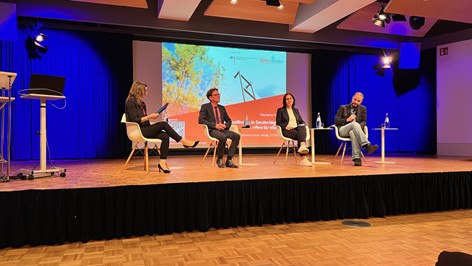Review of the transfer event of the Elitenmonitor research project

On May 15 and 16 , 2025, the transfer event of the joint research project elite monitor took place. A scientific workshop and a public conference provided an opportunity for intensive exchange with colleagues and an interested public - with exciting discussions, new impulses and valuable insights.
Public conference: Focus on questions of representation
After a brief introduction by the project spokesperson Dr. Lars Vogel, the public part of the conference began with a welcome address by the new Federal Government Officer for Eastern Germany, Elisabeth Kaiser. She acknowledged the importance of the project Elitenmonitorproject, which was initiated by her predecessor Carsten Schneider, and emphasized its relevance for the analysis of social participation and representation as well as the current challenges in German-German relations.
In the first thematic block, key findings from the research project were then presented: Dr. Lars Vogel used the Leipzig elite database - a complete collection of biographical data from over 4,000 holders of around 3,000 elite positions - to show how the share of the elite in society has changed.000 elite positions - showed how the proportion of East Germans in central top positions has developed over the past 6 years and drew a mixed conclusion: slight increases in individual sectors (e.g. politics, science, media) are offset by sectors in which the figures remain at a consistently low level or are even declining (e.g. military, business, culture). Of particular relevance here is the fact that 49.9% of positions were newly filled in the 2018-2023 observation period, meaning that there would certainly have been opportunities for a higher increase. Prof. Dr. Marion Reiser then presented the results of the elite survey, in which elite members were asked about their attitudes and self-images.
To conclude, Prof. Dr. Raj Kollmorgen discussed the findings from qualitative interviews with members of the elite in eastern Germany, focusing in particular on the obstacles to advancement and the factors that promote advancement at the various career stages. According to the initial results of the interview analysis, there are level-specific requirements for advancement to the next career level. The overarching mechanism is the recruitment logic of being wanted and asked, which refers centrally to the role of social capital and networks. This in turn presupposes that the aspirants are present in central institutions of the respective sector at an early stage. Working close to management at an early stage also proves to be helpful. However, East Germans tend to be at a disadvantage in both aspects, as the low density of institutions and companies in the East German federal states requires early mobility of East German aspirants. Reference was also made to the role of homophily - the preference for socially similar people - in the recruitment process.
The second block broadened the focus to other underrepresented groups: Women and people with a migration background. In her contribution, Prof. Dr. Miriam Hartlapp(Freie Universität Berlin) addressed the structural disadvantage of women in the Bundestag and referred, among other things, to France, where a legal parity regulation has significantly improved representation. Prof. Dr. Sabrina Zajak(DeZIM) then spoke about access barriers for people with a migration background. Particular attention was paid to the difficulty of conceptualizing this extremely heterogeneous group - a challenge that has a considerable impact on the data situation and interpretations in representation research.
In the third thematic block, Prof. Dr. Astrid Lorenz(University of Leipzig) presented concrete recommendations for action to strengthen East German representation, which were developed as part of the Elitenmonitor project. In addition to the individuals themselves, these also addressed organizations and the system as a whole. The recommendations for action focus on the role of mentoring and networks as well as support through scholarships in order to compensate for structural disadvantages. At the same time, however, they also call on East German aspirants to take a closer look at the criteria for career development and the prerequisites for successful careers. Greater sensitivity on the part of organizations and the system as a whole and a questioning of current recruitment mechanisms are also necessary.
Following this, a panel of East German leaders, moderated by Prof. Dr. Astrid Lorenz and Linus Paeth, discussed the prospects for more diversity in the elite. Also present were:
The debate on the podium represented the entire spectrum of the discourse regarding the underrepresentation of East Germans and showed a variety of experiences, assessments of the current situation and recommendations for action from their own practice. Major General Wolfgang Ohl, for example, referred to the closed career system of the military and the principle of senority, according to which East Germans are still on their way to elite positions and he therefore does not see an underrepresentation problem. Pollmer spoke about the discursive imbalance in the media and his experience of being reduced to his East German origins. Simona Stoytchkova, on the other hand, emphasized the importance of networks, mentorships and special trainee programs to overcome the disadvantages of East Germans in the recruitment process. The participants agreed that it would be desirable to overcome the division into "East" and "West" as quickly as possible.
Academic workshop: Descriptive representation and unequal recruitment opportunities for elite and leadership positions
The conference was accompanied by an academic workshop on both mornings, in which the specialist community exchanged views on current research papers on representation issues, mechanisms and barriers to advancement. In addition to East Germans, the focus was also on women and people with a migration background. Many of the contributions used quantitative approaches to analyze the extent, causes, effects and mechanisms of underrepresentation - particularly in politics and science, but also in business, administration and the judiciary. In one contribution, the TRAWOS research team (Prof. Raj Kollmorgen, Jan Schaller and Mara Börjesson) addressed the role of habitus as a possible cause of the underrepresentation of East Germans.